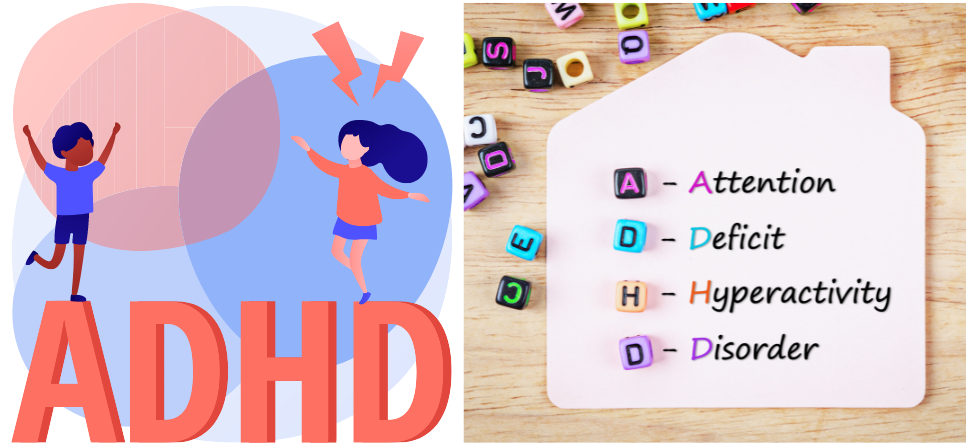What is ADHD?
ADHD stands for Attention Deficit Hyperactivity Disorder. ADHD is the most common mental condition affecting children and adults. Attention Deficit Hyperactivity Disorder symptoms include hyperactivity, inattention, and impulsivity. According to estimates, 2.5% of adults and 8.4% of children have Attention Deficit Hyperactivity Disorder. ADHD is commonly first diagnosed in childhood and often persists into adulthood.
People with ADHD (attention deficit hyperactivity disorder) have brain differences that impact their attention. They can be distracted more quickly as compared to those who don’t have ADHD. They frequently struggle with maintaining their organization, focusing on a task, and finishing what they start. In this blog, we will discuss Attention Deficit Hyperactivity Disorder and provide details on strategies for managing ADHD. Keep reading this blog to learn more about it.
Behavioral Strategies
Attention Deficit Hyperactivity Disorder is known as a neurodevelopmental disorder that impacts an individual’s ability to organize, focus, and regulate behavior. Here are a few ADHD behavior strategies that can be beneficial for managing the symptoms of Attention Deficit Hyperactivity Disorder:
Reduce distractions: Distractions can be the most challenging thing for people with ADHD. Concentration and focus can be improved by reducing distractions by making a quiet workstation or using noise-canceling headphones.
Make a regular schedule: People with Attention Deficit Hyperactivity Disorder frequently experience difficulties with task completion and time management. Organization and stress might be improved by establishing a schedule with established hours for everyday tasks.
Use visual aids: Visual aids such as checklists, color-coded schedules, and reminder notes may help people with ADHD stay on task and remember essential details.
Give frequent feedback: People with Attention Deficit Hyperactivity Disorder may stay focused and motivated with frequent positive reinforcement and feedback.
Divide tasks into smaller parts: People with ADHD may feel overwhelmed by large tasks. Dividing them into smaller, more manageable parts may make them less intimidating and simpler to complete.
Exercise mindfulness: Mindfulness techniques, including meditation or deep breathing, may assist individuals with Attention Deficit Hyperactivity Disorder in relaxing their minds and increasing focus.
Use physical activity: Daily physical activity, such as exercise or taking breaks to move around and stretch, helps people with Attention Deficit Hyperactivity Disorder. These activities may help them to improve focus and release excess energy. It’s vital to remember that each person with ADHD is different, and what works for one person might not work for another.
Collaborating with a mental health expert is crucial to create a personalized treatment strategy for Attention Deficit Hyperactivity Disorder symptoms. They may provide you with better strategies for dealing with ADHD.
Dealing with stress and emotions
Dealing with stress and emotions might be difficult for people with ADHD. However, various strategies may help. Here are a few tips:
Recognize your triggers: Recognize events or situations that cause you to stress and produce emotional dysregulation. Knowing your triggers may enable you to plan and create coping strategies.
Practice mindfulness: I have already mentioned this point in the above section. It may help you stay focused on the current moment. It would be best if you tried mindfulness meditation to improve your concentration. Additionally, it might increase your awareness of your feelings and bodily sensations, enabling you to respond rather than react in an impulsive manner.
Regular exercise: Exercise may help lower anxiety and stress and improve mood. You should find a physical activity you want to do and include it in your daily routine.
Get proper sleep: Stress levels may rise, and ADHD symptoms might worsen due to sleep deprivation. You should aim for 7 to 9 hours of sleep per night and set up a regular sleep schedule.
Create a support network: Make connections with supportive and understanding people. It can be a member of your family, close friends, or an ADHD support group.
Seek professional help: A mental health expert may assist you in developing strategies and give support to manage emotions and stress. These strategies for managing ADHD will be helpful when you consistently follow them.
Treatment options for ADHD
There are various treatment alternatives for Attention Deficit Hyperactivity Disorder which might include:
Medicines
Stimulants, including Vyvanse, Adderall, and Ritalin, are mainly used to treat attention deficit hyperactivity disorder. These drugs act by boosting the levels of norepinephrine and dopamine in the brain, which may help lower impulsivity and improve concentration.
If you take these drugs under the consultation of an experienced healthcare expert, you will see better results. Taking medicines properly is one of the best strategies for dealing with Attention Deficit Hyperactivity Disorder.
Behavioral therapy
It might include numerous forms of counseling, including social skill training, cognitive behavioral therapy, or parent training. These approaches aim to assist people in developing coping strategies and enhancing their executive functioning skills.
Support groups
A support group may offer a supportive environment for people with Attention Deficit Hyperactivity Disorder. It helps to connect with people who share the same experiences and learn from each other.
Lifestyle changes
It may include a healthy diet, exercise, and good sleep hygiene. These activities may help manage Attention Deficit Hyperactivity Disorder symptoms and improve overall health.
As mentioned above, you may take the help of yoga, meditation, or acupuncture to treat your Attention Deficit Hyperactivity Disorder. These are all the best strategies for managing ADHD symptoms.
Diagnosis and assessment
The assessment and diagnosis of ADHD generally involve a comprehensive evaluation by a healthcare expert. It includes observation of behavior, medical interviews, and a standardized rating scale completion.
Medication management
One of the most major and common treatments for Attention Deficit Hyperactivity Disorder is medication management. Here are a few of the commonly used drugs for ADHD.
Alpha-2 agonists: Alpha- 2 agonists are drugs that act by regulating norepinephrine levels in the brain. They are generally used as a second-line treatment for Attention Deficit Hyperactivity Disorder. Few common alphas- 2 agonist drugs include Guanfacine and Clonidine.
Stimulants: Stimulants are highly prescribed drugs for Attention Deficit Hyperactivity Disorder. They function by raising dopamine and norepinephrine levels in the brain, which enhances focus and attention. Ritalin, Adderall, and Vyvanse are a few examples of popular stimulant drugs. We have already mentioned these drugs in the above lines.
Non-stimulants: For individuals who cannot handle stimulants or who haven’t found them helpful, non-stimulant drugs are frequently prescribed. They function by raising the brain’s norepinephrine levels. Intuniv and Strattera are two examples of popular non-stimulant medicines.
Healthy lifestyle choices
Adopting a healthy lifestyle may give you beneficial outcomes if you have Attention Deficit Hyperactivity Disorder. If you choose a healthy lifestyle, it helps to manage your symptoms more effectively.
Parenting strategies for children with ADHD
It can be challenging to parent a child with ADHD (Attention-Deficit/Hyperactivity Disorder), but some strategies can be helpful. Here are a few tips:
Create a structure and routine: Routines and structure make children with Attention Deficit Hyperactivity Disorder feel more secure and in control, which is helpful for their development. Establish regular times for meals, playtime, homework, and bedtime on your child’s schedule. Creating a structure and routine is one of the best strategies for managing ADHD.
Use motivating tactics: When your child does something well or behaves well, such as finishing a task or following instructions, give them praise. This might motivate your child to carry on with the behavior.
Provide concise and clear instructions: Children with Attention Deficit Hyperactivity Disorder might have problems following multi-step instructions. Be concise and clear when providing instructions, and divide them into smaller steps.
Use visual aids: Visual ads, including diagrams, pictures, and charts, might be beneficial in helping your child remember and understand information.
Seek support: Parenting a child who has Attention Deficit Hyperactivity Disorder might be difficult. Do not feel hesitation while seeking support from friends, family, or professionals. Join a support group or look for a therapist who has experience with families with ADHD children.
Thriving with ADHD: ADHD might offer specific difficulties, but it is possible to thrive with this disease by making some adjustments and employing particular tactics. You have to understand your challenges and strengths.
You can create a regular schedule and reduce the likelihood of feeling forgetful or overwhelmed. If you follow these strategies for dealing with Attention Deficit Hyperactivity Disorder, you will see the benefits.
Practical tips for everyday management
Here are a few practical tips for the everyday management of Attention Deficit Hyperactivity Disorder:
- You should sit in the front seat of your class to avoid distractions.
- Always turn off your phone while working or doing any task.
- You may talk to your teacher about your Attention Deficit Hyperactivity Disorder condition.
Besides, you can take the help of exercise and meditation (as mentioned above).
Conclusion
Hope! You have learned many essential details about Attention Deficit Hyperactivity Disorder. In this blog, we have provided a few helpful strategies for managing ADHD. You can try them to see the positive outcomes.

